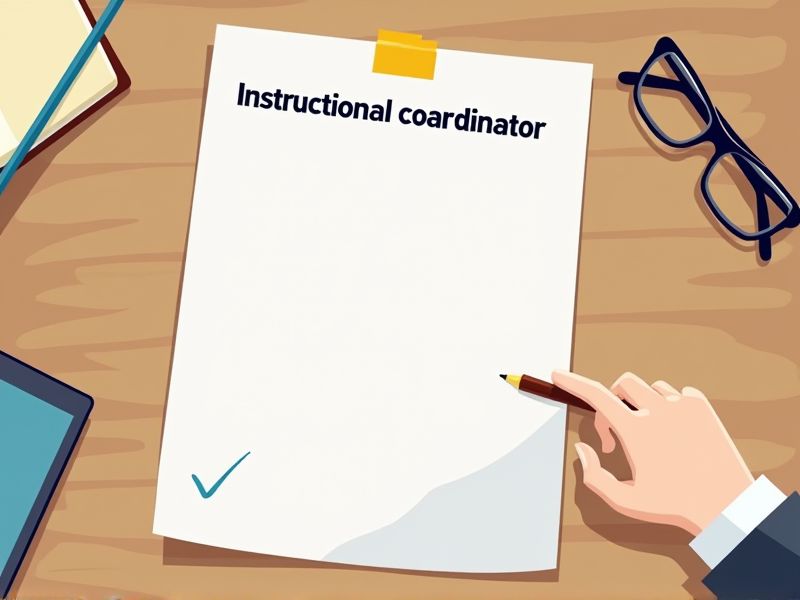
Instructional coordinators play a critical role in shaping educational curriculum and ensuring teaching effectiveness. Certain certifications validate their expertise and signal a commitment to educational standards, thereby enhancing their credibility in a competitive field. These certifications often cover areas such as curriculum design, educational leadership, and assessment methods, crucial for effective program implementation. Below are some essential certifications you may need as an Instructional Coordinator.
Certified Professional in Learning and Performance (CPLP)
The CPLP certification equips instructional coordinators with validated expertise in learning and performance, which is crucial for developing effective educational programs. It enhances their credibility, leading to increased trust from educational institutions and stakeholders. Holding a CPLP signifies a commitment to ongoing professional development, aligning with the evolving requirements of instructional strategies. This certification also often results in better career prospects and higher earning potential, given the specialized skills and knowledge acquired.
Certified Instructional Designer/Developer (CIDD)
The presence of a Certified Instructional Designer/Developer (CIDD) enhances the effectiveness of curriculum development through specialized expertise. Their certification ensures adherence to best practices in instructional design, which directly impacts learner engagement and comprehension. With data-driven methodologies, a CIDD systematically evaluates and improves instructional materials, thereby increasing educational outcomes. These developers bridge the gap between educational theory and practical application, optimizing resources for instructional coordinators.
Google Certified Educator (Level 1 & Level 2)
The Google Certified Educator (Level 1 & Level 2) equips instructional coordinators with the skills to integrate Google tools effectively, enhancing digital literacy among staff and students. Proficiency in these tools streamlines communication and collaboration, key components in optimizing educational outcomes. Holding these certifications validates an instructional coordinator's commitment to continuous professional development and staying current with educational technology trends. The certifications can also improve credibility with stakeholders, fostering trust in the coordinator's ability to lead tech-driven educational initiatives.
ISTE Certification for Educators
ISTE Certification for Educators provides instructional coordinators with updated knowledge of integrating technology effectively in educational settings. Teachers benefit from this certification as it enhances their ability to design curriculum that aligns with digital learning standards. The certification equips coordinators with tools to lead professional development sessions, fostering a tech-savvy educational environment. Data from schools with ISTE-certified coordinators indicate improvements in student engagement and learning outcomes through technology integration.
Quality Matters Certification in Online Course Design
Quality Matters Certification ensures instructional coordinators uphold high educational standards in online course design, promoting effective learning outcomes. As online education expands, maintaining consistent course quality becomes crucial, directly impacting student engagement and satisfaction. Certification equips coordinators with proven methodologies, driving evidence-based course improvements. Quality assurance in course design fosters institutional credibility, attracting both students and educators.
Adobe Captivate Specialist Certification
An Adobe Captivate Specialist Certification equips an instructional coordinator with advanced skills in creating effective e-learning content, directly impacting the quality of digital education materials. The certification demonstrates proficiency in utilizing Adobe Captivate's features, leading to more interactive and engaging learning experiences. As educational technology continues to evolve, having this certification can enhance a coordinator's ability to implement innovative solutions. Employers often seek certified professionals to ensure the organization's training programs are cutting-edge and competitive.
eLearning Instructional Design Certificate
An eLearning Instructional Design Certificate equips instructional coordinators with the skills to create effective online learning experiences. Without a structured approach to design, educational programs may lack engagement and fail to meet learning objectives. As educational technologies evolve, staying updated with best practices becomes crucial for efficacy in teaching. Having a certificate signifies a standard level of competency and credibility in the field.
Microsoft Certified Educator
Microsoft Certified Educator certification provides instructional coordinators with current knowledge of integrating technology in educational settings, enhancing curriculum development. The certification equips educators with skills to utilize Microsoft tools effectively, fostering an engaging and interactive learning environment. Possessing this certification demonstrates the coordinator's ability to promote digital literacy, aligning with modern educational standards. This recognition can improve an institution's credibility and attract students seeking technologically advanced learning experiences.
Project Management Professional (PMP)
PMP certification provides instructional coordinators with advanced project management skills, enhancing their ability to develop and implement educational programs efficiently. It equips them with methodologies to effectively manage time, budget, and resources, crucial for curriculum development projects. By applying PMP principles, instructional coordinators can ensure educational initiatives align with institutional goals and foster improved learning outcomes. Research indicates that PMP-certified professionals in education often lead projects more successfully, resulting in higher quality programs and satisfied stakeholders.
Advanced Instructional Design Certificate
Instructional coordinators play a pivotal role in shaping effective learning experiences, so obtaining an Advanced Instructional Design Certificate enhances their understanding of cutting-edge pedagogical strategies. With the rapid integration of technology in education, this certification equips coordinators with the necessary skills to design contemporary, tech-forward curricula. A deeper knowledge of advanced instructional design can lead to more effective training programs and improved learner outcomes. Possession of this certificate can increase a coordinator's credibility and open up further career advancement opportunities in educational leadership.
Summary
When you, as an instructional coordinator, obtain relevant certifications, you become equipped with advanced methodologies and strategies for curriculum development. This knowledge can lead to more effective instructional programs, enhancing overall educational quality. As schools benefit from improved programs, student performance is likely to increase due to more engaging and relevant content. Your role in professional development strengthens, making you a pivotal resource in training and supporting teaching staff.
